Key takeaways:
- Active listening reveals community needs and personal stories can amplify advocacy efforts.
- Religious education fosters mutual respect and empathy across diverse groups.
- Building genuine relationships and sharing personal experiences enhance advocacy impact.
- Success in advocacy can transform communities, as seen through initiatives like community gardens and mental health resources in schools.
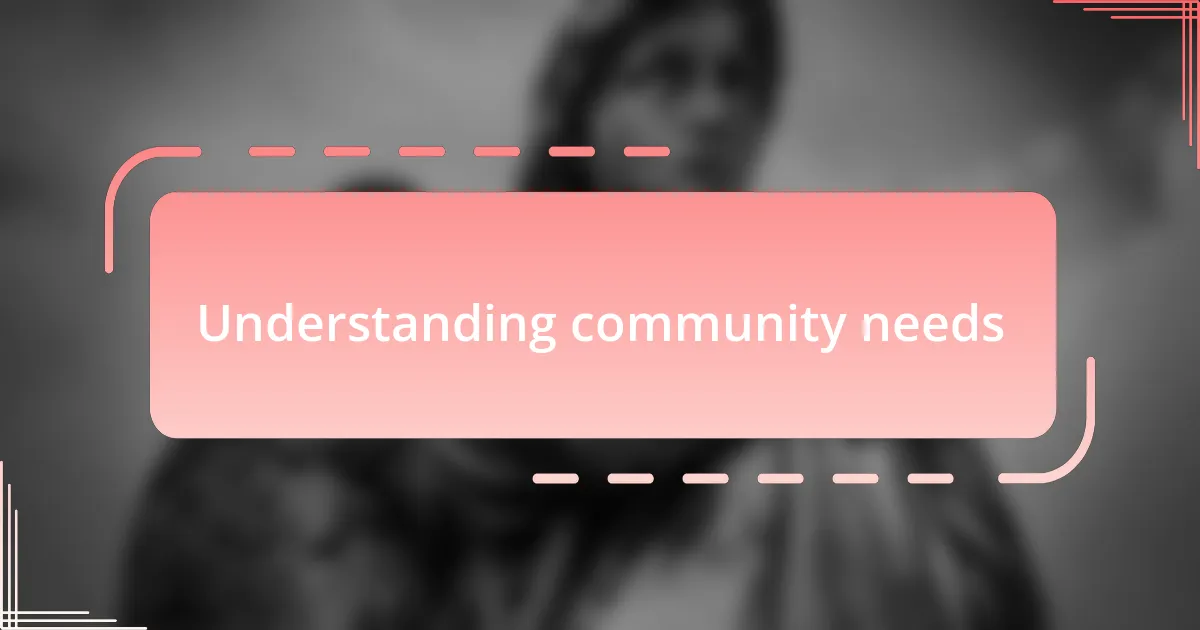
Understanding community needs
Understanding community needs is a complex but rewarding endeavor. I remember attending a local meeting where residents expressed concerns about limited access to educational resources. Hearing their heartfelt stories made me realize just how crucial it is to listen actively to the voices in our community.
One day, I met an elderly gentleman who shared his lifelong passion for teaching youth about our cultural heritage. His desire to impart knowledge was palpable, yet he felt disconnected from the very community he wanted to serve. It struck me: How often do we miss out on valuable insights because we overlook the rich experiences of those around us?
In my experience, identifying these needs often requires stepping outside my comfort zone. I’ve participated in community surveys and informal discussions, finding that everyone has a unique perspective. This diversity of opinion reveals the nuanced layers of our community’s expectations and aspirations, reminding me that true understanding involves more than just hearing; it requires genuine engagement.
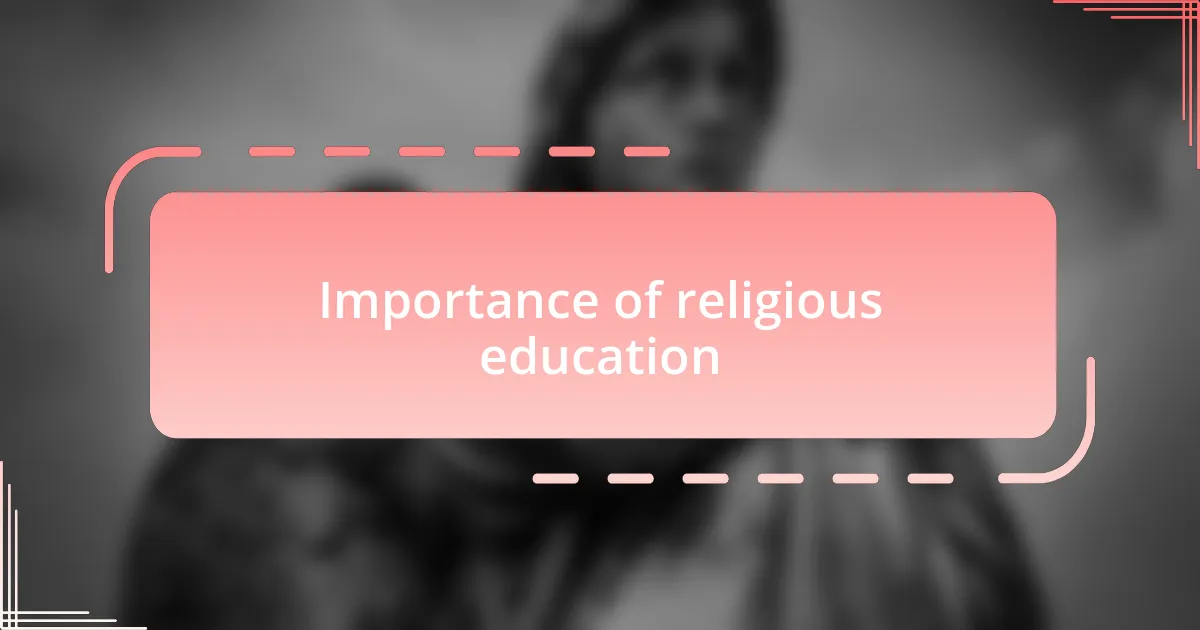
Importance of religious education
Religious education plays a pivotal role in shaping the moral compass of a community. I recall a time when our community organized a youth retreat focused on interfaith dialogue. This experience was eye-opening for me; seeing teenagers from various backgrounds connect on shared values rather than differences reminded me that religious education fosters mutual respect and understanding among diverse groups.
The importance of religious education extends beyond mere academic knowledge. I’ve often found that discussions about faith can lead to profound self-reflection and personal growth. For instance, when I facilitated a workshop about compassion in religious texts, participants shared how these teachings influenced their daily lives. It made me appreciate how religious education can serve as a bridge to cultivate empathy and kindness in our interactions with others.
Moreover, engaging with religious teachings helps individuals find purpose and belonging. I remember an adult in our congregation sharing how her faith community supported her during tough times. This illustrates how religious education isn’t just about learning doctrines; it’s about building a supportive network where individuals feel valued and understood. Isn’t it remarkable how the lessons from these teachings can resonate in our everyday lives?
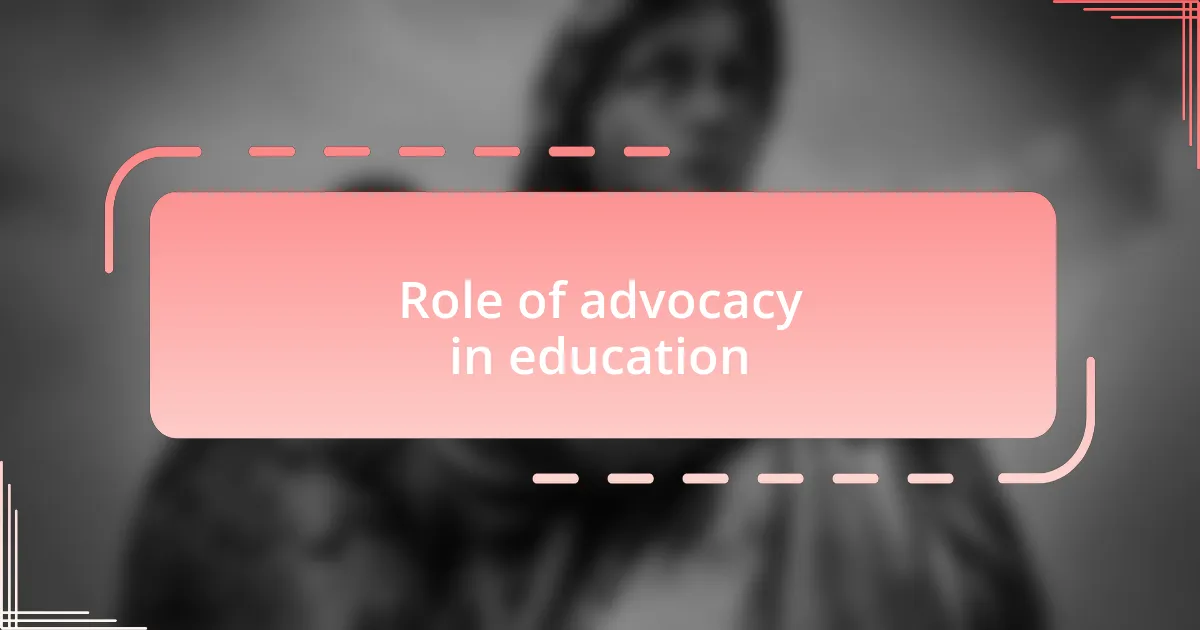
Role of advocacy in education
Advocacy in education serves as a vital mechanism for amplifying the voices of those often overlooked. I vividly recall a community meeting where a teacher passionately articulated the need for more inclusive curricula. Her dedication to ensuring that every student’s culture was represented not only inspired her peers but also motivated the administration to reconsider their educational policies. How often do we overlook the impact one advocate can have on an entire system?
In my experience, advocacy empowers educators and students alike to challenge the status quo. When I participated in a campaign to address disparities in resource allocation, I witnessed firsthand how gathering data and sharing personal stories could sway opinions. I still remember the moment a school board member expressed a newfound understanding of the challenges faced by underfunded programs. This taught me that advocacy is a collective effort; when people come together with a shared purpose, their impact can be transformative.
Additionally, I believe advocacy creates a sense of community ownership in education. During my time volunteering with a local organization, I saw parents rallying together to voice their concerns about the curriculum. Their collective action was not only empowering but also demonstrated a deep commitment to ensuring that the educational experiences of their children were enriched. Isn’t it rewarding to think that, through advocacy, we can help shape the educational landscapes that influence our future generations?
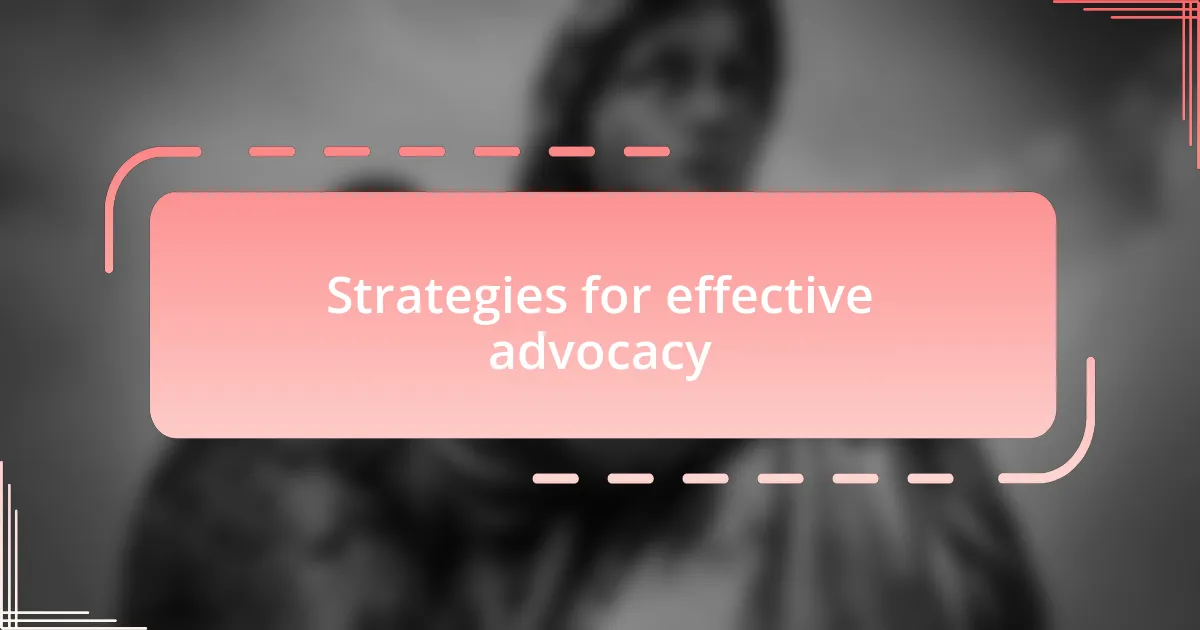
Strategies for effective advocacy
When advocating for community needs, one effective strategy is building genuine relationships with stakeholders. I remember attending a town hall meeting where I had the chance to connect personally with local leaders. Listening to their views and concerns created a space for open dialogue and trust, which is essential for effective advocacy. Have you ever noticed how relationships can open doors that raw data alone cannot?
Another approach is to utilize storytelling as a powerful tool for engagement. I once shared a heartfelt story about a student’s struggles with limited access to resources during a presentation. That single narrative sparked an emotional response from the audience and led to a collaborative initiative to address the issue. Isn’t it fascinating how personal experiences resonate more deeply than statistics?
Finally, organizing community forums can foster greater awareness and action. I helped facilitate a discussion where community members shared their needs and aspirations. These gatherings not only empowered individuals to voice their opinions but also allowed us to identify common goals. Have you contemplated how such collective conversations can shape a vibrant advocacy movement?
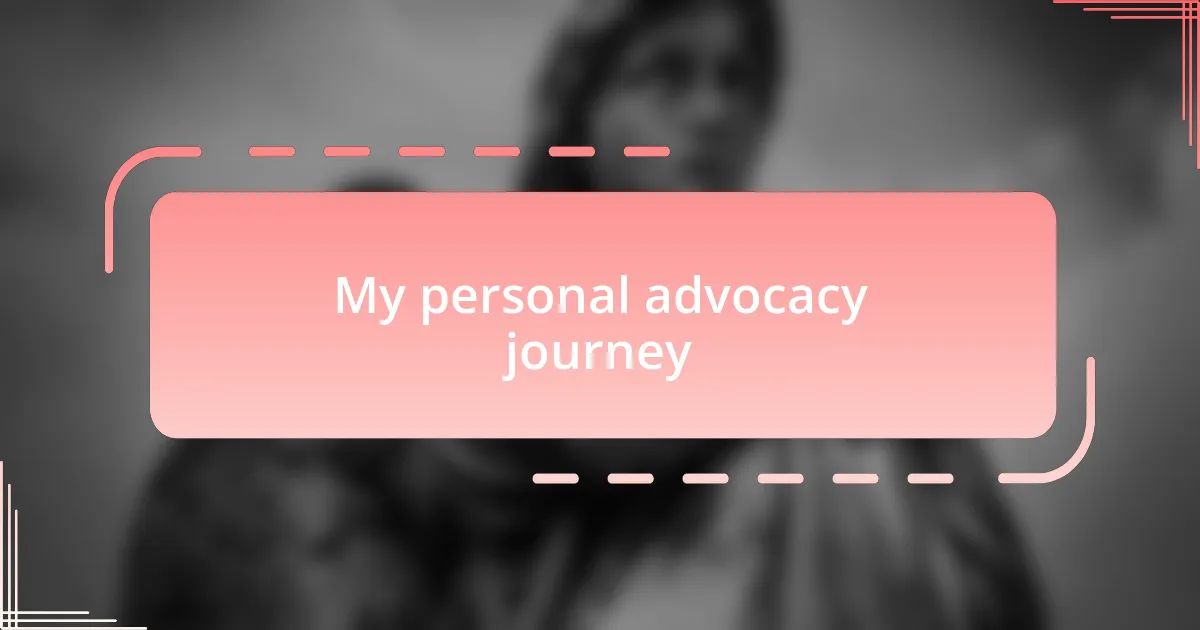
My personal advocacy journey
During my advocacy journey, I realized that each step taken was rooted in a deeply personal motivation. I recall volunteering at a local food pantry, where I met families struggling with hunger. Their stories became my fuel, pushing me to amplify their voices and share their experiences within larger community discussions. Have you ever felt the impact of someone’s story on your actions?
One pivotal moment occurred when I successfully coordinated a community rally to address educational inequities. Standing before a sea of faces, I felt a surge of emotion as I articulated the struggles many children faced in our area. The energy was electric; it was more than just a rally—it was a manifestation of collective hope and determination. Isn’t it amazing how a united front can inspire change?
Throughout this journey, I’ve faced skepticism and challenges that tested my resolve. I vividly remember a critical meeting where my ideas were dismissed, leaving me feeling disheartened. Yet, this very experience taught me resilience. I learned to refine my approach and seek feedback, which ultimately strengthened my advocacy efforts. Have you found that sometimes setbacks lead to the most significant breakthroughs?
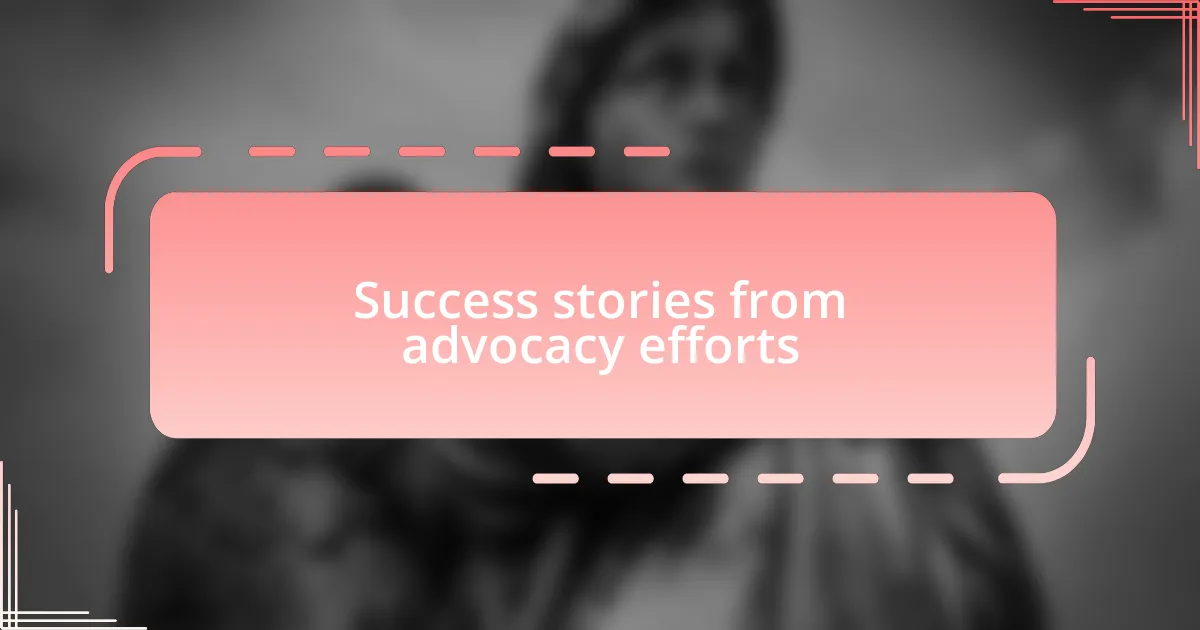
Success stories from advocacy efforts
One of my proudest moments in advocacy came when we successfully launched a community garden project. The transformation was remarkable; what began as a vacant lot now flourished with vibrant vegetables and herbs, cultivated by local families. Seeing children excitedly learn about healthy eating through hands-on experience brought tears to my eyes. How often do we underestimate the power of nature and community in nurturing our souls?
Another success story unfolded when we secured funding for after-school programs aimed at disadvantaged youth. I remember the moment we heard the news; the sense of relief among parents was palpable. Their gratitude reflected the profound impact of such initiatives on our children’s futures. Have you ever witnessed the power of educational opportunities flourishing against all odds?
Lastly, we championed a campaign that led to the inclusion of mental health resources in local schools. I vividly recall speaking with a teenager who had struggled in silence for years. When I learned that our advocacy had resulted in accessible support channels for students, it felt like a weight lifted off many shoulders. Isn’t it heartwarming to know that when we raise our voices for the community, we can genuinely change lives?
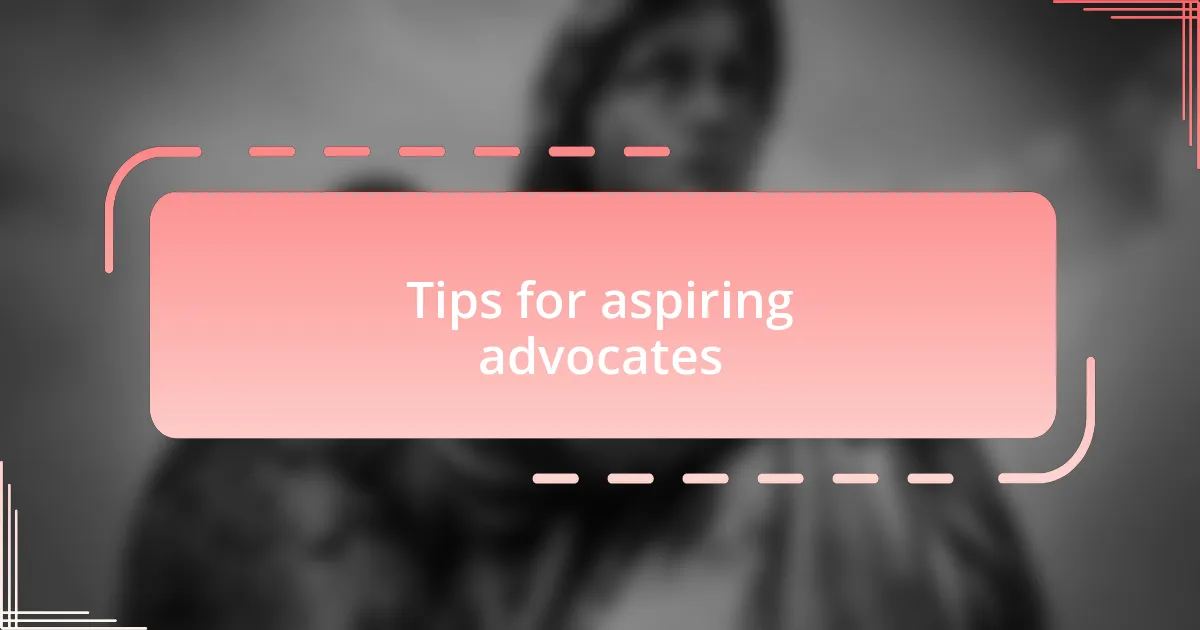
Tips for aspiring advocates
When I first started advocating for community needs, I learned the importance of listening. One evening, I attended a community meeting, hoping to share my ideas. However, what struck me most was the stories shared by residents; their voices guided my understanding of what truly mattered to them. Have you ever paused to really listen to your community?
Building relationships is equally vital. At times, I found myself visiting local leaders and organizations, not just to present my goals but to forge genuine connections. I remember one meeting where, over coffee, a local pastor shared his vision for youth outreach. That personal touch made it easier to collaborate and align our efforts. I believe that the stronger the relationships, the more effective the advocacy becomes.
Don’t shy away from sharing your journey, including the mistakes along the way. Early in my advocacy, I misjudged a meeting with city officials, thinking my proposal would be met with enthusiasm. Instead, I faced skepticism. Instead of retreating, I embraced those moments as learning experiences. They taught me resilience and refined my approach for future discussions. How has failure shaped your own path?